Viking Longship Models
From DT Online
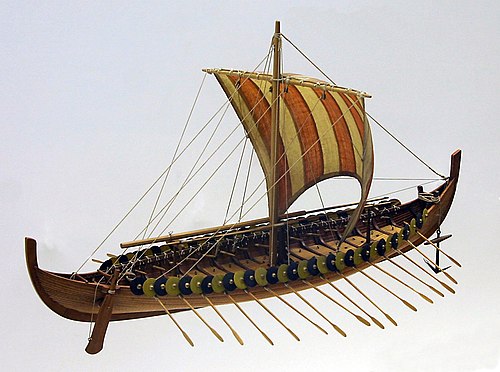
Description
Longships were long elegant craft used by The Vikings to cross the North Sea, first on raiding missions and later to explore and settle in Engand, Ireland, Iceland and beyond. They were a wooden construction with a shallow Draft which meant they could be rowed up shallow rivers as well as across the sea, powered by oars and their large square woollen sail. They could also land on beaches and were light enough to be carried when necessary and tipped upside down to use as a temporary shelter.
Model Longships
Making models of historic buildings and objects is a good way to understand them and remember what has been learned - it is also good fun! Models of Viking Longships can be made using: 'Found Materials', Card and Stripwood Materials - and some of them can be made to float!.
Each of the models described uses a Deck Frame to separate the two Hull sides and provide strength. The frames are constructed using 8mm or 10mm square Stripwood reinforced with Medium Card triangles.
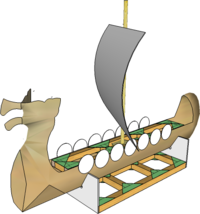
Viking Longship made from A3 sheet of card
A good size model Longship can be made from a single sheet of A3 Medium Card.
Avantages:
- The shape of the hull, the figurehead and the tail can all be cut together;
- The sides may be cut separately with scissors or together by folding the card first;
Disadvantages:
- Stronger scissors may be needed if cutting through both thicknesses of card together
- The Hull will either need to be covered with plastic packaging tape, or plastic laminated 'shiny' card used, to make it water-resitant.
- It will need a support stand to display it.
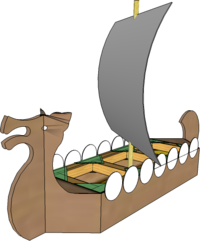
Longship based on a fruit juice carton
A model Longship can be based on a 1 litre laminated card juice carton to make the Hull.
Avantages:
- The cartons are readily available and easily cut with scissors
- When cut in two, the cartons provide ready made Hull shapes
Disadvantages:
- The 'waxy' coating on the inside, and plastic laminate on the outside, may not accept PVA glue.
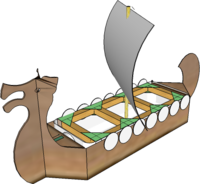
Model Longship based on milk carton
A model Longship can be based around a plastic milk carton.
Avantages:
- The plastic 'bottles' are readily available and can be cut to create a water-proof Hull;
- The model decribed is based on a 1 litre 'bottle' but larger 'bottles' could be used (scale the drawings to suit);
Disadvantages:
- The 'bottles' are made out of a plastic called Polyethylene which is very difficult to glue;
- The bottom and neck of the 'bottle' may be too thick to cut with scissors and will need to be sawn.
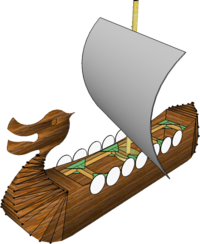
Viking Longship made from thick card
A Viking Longship can be made from Thick Card.
Avantages:
- Thick card is strong enough to make larger models
- The shape of the hull, the figurehead and the tail can all be cut together;
Disadvantages:
- This card is very difficult to cut with scissors and may need use of a Craft Knife together with Safety Ruler and Cutting Mat;
- The Hull will either need to be covered with plastic packaging tape, or plastic laminated 'shiny' card used, to make it water-resitant.
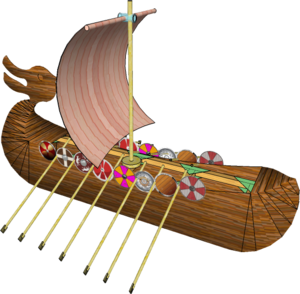
Completing the Longships
- Add a Mast by 'stepping' a length of Dowel into a MDF or Ply Disc and glue to the Deck Frame or to the bottom of the Hull;
- Add a Main Spar by fixing a length of Dowel across the top of the Mast either by lashing with string and glue or by cutting two holes at right angles into a short length of PVC Tubing;
- Paint the Hull with enamel paint or cover with strips of plastic tape to make it more water resistant;
- Make a Sail out of Thin Card, paint as required and glue along the Main Spar;
- Design and paint Viking Shields on MDF, Ply or Card Discs and glue along the sides of the Hull;
- Add Oars made by squashing the end of Art Straws or Drinking Straws.
Notes:
- MDF Discs which are pre-drilled are most useful if available, otherwise this might be done as preparation before using with younger children - alternatively a Hand Drill Stand could be used (if neccessary, adults or older children can cut them out of strips of MDF or Ply using a Holesaw).
- Dowels 4mm, 5mm, and 6mm are useful sizes for axles.
- Florist Wire is easily bent into shape whereas stiff wire, such as Brass Brazing Rod, is more suitable for connecting rods.



















